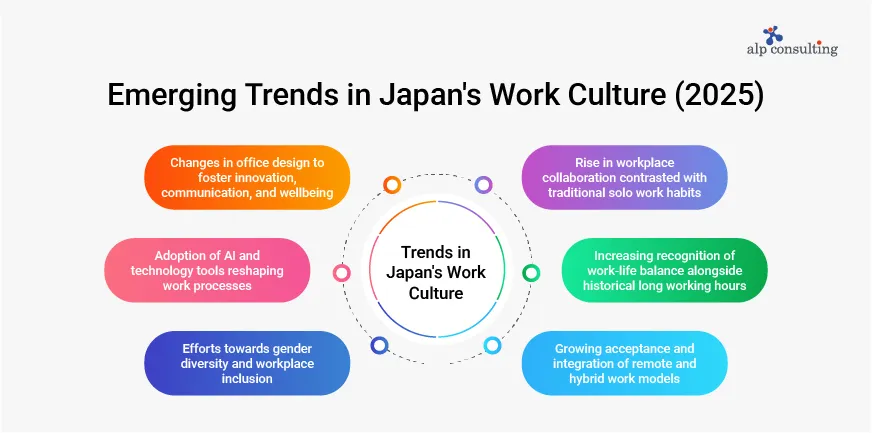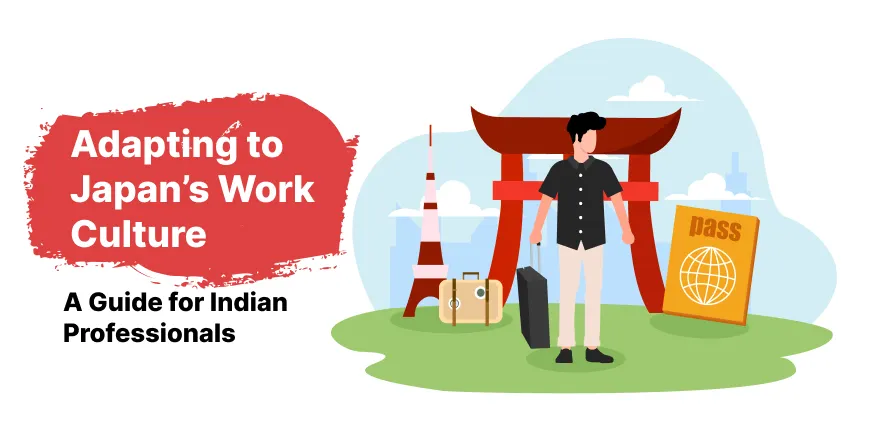
What is Employee Engagement and How to Boost It in 2026?
22/09/2025
Learning and Development: A Comprehensive Guide
22/09/2025Are you fascinated by Japan? Its culture, way of life? Work systems? Well, the appeal is real. If you are keen on moving to the country or working for a multinational enterprise, with a Japanese cultural background, you must be prepared to take on the challenges. Japan has its unique possibilities that can be rewarding.
Indian professionals looking to join Japanese companies must first understand the traditions, values, rules, etc, and then adapt to them effortlessly if they want success, smooth integration, and job satisfaction.
Kōnosuke Matsushita, founder of Panasonic, said, “No matter how deep a study you make. What you really have to rely on is your own intuition, and when it comes down to it, you really don’t know what’s going to happen until you do it.”
Understanding Key Elements of Japanese Work Culture
Let us help you understand the significant elements that enable Japanese workplaces to be appealing:
1. Hierarchy, Seniority, and Decorum
Japanese work culture is determined by several aspects, of which one of the most important is respecting seniors. There is the concept of Senpai-Kohai dynamics. Where senpai is the senior and kohai the junior. The responsibility of the senior is to guide and mentor the junior, while the junior shall respect and be loyal to his senior. Another element that is valued is being humble in the workplace.
2. Team Harmony and Collective Decision Making
A core cultural value in workplaces is maintaining harmonious relationships with colleagues, resulting in a unified and peaceful work environment. Behaviours like upfront confrontation or direct criticism might be hurtful. Employees are expected to uplift the group spirit by maintaining cordial relationships.
3. Indirect Communication Subtle Gestures
Japanese workspaces nurture a culture where curt statements and arguments are not appreciated. Professionals need to be polite, subtle, and treat their colleagues kindly. If they have a strong opinion, they must refrain from expressing it directly and resort to nonverbal cues.
4. Official Demeanour and Professional Courtesy
The way you behave in a professional setup significantly reflects your values in Japanese work culture. You must know how to properly greet and address your colleagues, maintain proper conduct and dress code, etc. Indian professionals must adapt to the etiquette and follow it religiously.
5. Working Schedule and Work Ethics
Many Japanese offices expect their employees to be dedicated beyond working hours and diligently deliver regardless of standard working schedules. It has been a traditional practice to be loyal to the company and be prepared to stay late and work. However, organizations today are understanding the concept of work-life balance, and many companies.

Linguistic Advantage
Learning the Japanese language is not just an advantage for Indian professionals, but it is a pathway to immerse themselves in the cultural and professional gamut. Language plays a vital role in shaping the future of a foreign professional in Japan. Although English is accepted, to get a good grip of the culture and nuances, you must learn Japanese.
Tips- If you plan on living and working in Japan long-term, you can achieve a basic conversational level (N5–N4 of the JLPT) and make a difference. For those aiming for advanced roles, they must go for business Japanese proficiency (N2–N1).
Challenges Indian Professionals May Face
| Challenge Area | Indian Professionals Experiences | Japanese Cultural Expectation / Practice | Impact |
| Language Barrier | The assumption that English is sufficient and acceptable for global roles | Japanese is widely used (documents, meetings, clients) | It can jeopardize team spirit, communication, and hinder daily life without language help. |
| Indirect Communication | Used to communicating and expressing opinions directly, upfront discussions, and feedback | Subtle, indirect, and mostly nonverbal communication styles | Chances of misunderstandings and miscommunication. |
| Seniority and Hierarchy | Highly unprejudiced and flexible structures | Strong emphasis on hierarchy, tenure, and rank | There can be discomfort and hesitation among juniors to speak up. |
| Group Harmony | Comfortable with debate, discussions, and voicing viewpoints | Focus on consensual decisions, avoiding disagreements and conflicts. | Being assertive could imply being disrespectful. |
| Formality & Etiquette | Casual dressing and communication in many offices. | Maintaining formal dress codes and presenting oneself well are essential. | Not following the norms might reflect unprofessionalism and impoliteness. |
| Punctuality | Flexibility is a common feature in Indian workplaces. | Being unpunctual or late is not acceptable | It might lead to trust loss and respect. |
| Work Hours & Overtime | Focus on productivity and results, flexible or task-based hours | Long hours and faithfulness to the company | Leaving “on time” may be seen as lacking commitment |
| Decision-Making Style | Top-down or quick decisions are common | Consensus-driven (bottom-up, slow but stable decisions) | May feel inefficient, but helps avoid future conflict |
| Work-Life Balance | Valued in India | Traditionally work-centric, though shifting gradually | May feel isolating or overwhelming without clear boundaries |
| Social Integration | Indian workplaces tend to be socially warm, open. | Personal-professional boundaries are stronger; socializing may feel reserved or formal. | May take longer to form connections, especially outside work |
Plan Effectively for Adapting Successfully
Here are some effective strategies that can help Indian professionals get adjusted to and flourish in a Japanese work landscape:
- Learn Japanese, even to a modest level
- Use apps, language classes, or language exchange groups.
- Observe first, then act
- Embrace a humility and service mindset
- Avoid embarrassing others or forcing confrontation.
- Time Management & Punctuality
- Build Relationships & Network
- Understand and respect formal etiquette
- Clarify expectations; be patient
- Balance work and well‐being
Expectations of Japanese Employers from Indian Professionals
Japanese employers want to know what specialized skills an Indian professional can bring to the table. Technical Skills, specifically in IT, R&D, and engineering, are in high demand. India’s expertise in STEM development is known to all, so professionals with STEM expertise can shine in Japan.
Professionals must not be undermined by mounting work pressure and learn to adapt quickly and intelligently solve issues without hesitation. Robust communication skills provide an impetus, especially when professionals are well-versed in both English and Japanese.
If you want to excel in your career in Japan, you must show confidence and the urge to learn and integrate into the culture, value them, and commit to long-term arrangements in a company.
How to Prepare Realistically
To embark on a Japanese culture and work landscape journey, and to prevent sudden surprises or inconveniences. You must be ready for low-paced processes in some cases where organizations are focused on hierarchies.
Promotions and salary increases might follow the rules about seniority and tenure, and not always performance. To gain knowledge of a new language and be fluent in it might take time, and even if your technical expertise is top class, not understanding Japanese might hinder you from attaining a specific position. Another significant aspect you need to understand is the work and visa rules.
The road to a successful career in Japan involves a few significant steps. The primary step is changing mindsets and adhering to new norms, values, and traditions. Then there are certain practical shifts that one must deal with.
The trick to exceeding expectations is to respect work colleagues, seniors, and the urge to learn Japanese, while being true to yourself.
Japan, The Land of the Rising Sun, is a country that can offer a bountiful of opportunities and hope to Indian professionals.
Contact Us For Business Enquiry

Rajkumar Shanmugam
Rajkumar Shanmugam is the Head of HR at ALP Consulting, bringing over 19 years of comprehensive HR leadership experience across India and international markets. His expertise spans talent acquisition, employee relations, performance management, compliance, and HR transformation. Rajkumar has a proven track record of driving people-centric initiatives, enhancing workplace culture, and aligning HR strategy with business goals. With extensive experience in US staffing operations and global mobility, he continues to lead organizational excellence through innovation and employee engagement.




